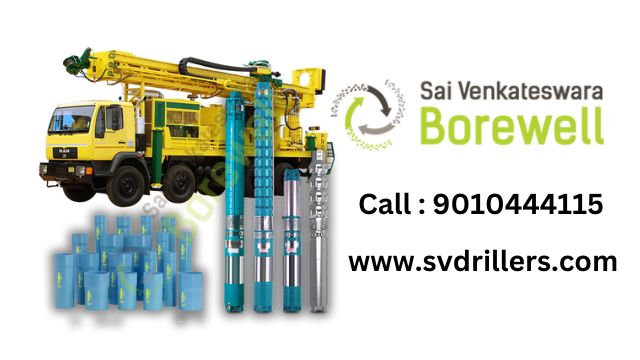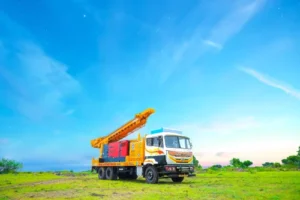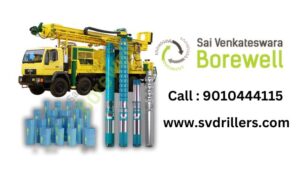Introduction
Are you planning to install a borewell but unsure which drilling machine is right for your project? Choosing the correct types of borewell drilling machine can make all the difference in efficiency, cost, and success. From residential water wells to large-scale industrial projects, different machines cater to varying soil conditions, depths, and budgets.
At SV Drillers, we help homeowners and businesses select the best borewell drilling equipment for their specific needs. In this guide, we’ll break down the 7 most common borewell drilling machines, their pros and cons, and how to pick the right one for your site.
What is a Borewell Drilling Machine?
A borewell drilling machine is specialized equipment used to dig deep holes (borewells) into the earth’s surface to extract groundwater or for geotechnical surveys. The choice of machine depends on factors like:
- Soil composition (soft, hard, rocky)
- Desired depth
- Project scale (residential, commercial, agricultural)
- Budget constraints
Let’s dive into the 7 major types of borewell drilling machines and their applications.
7 Common Types of Borewell Drilling Machines
1. Hand Operated Borewell Drilling Machine
Best for: Shallow wells, soft soil, rural areas
Depth Capacity: Up to 100 feet
Advantages:
- Low cost
- No electricity or fuel required
- Easy to transport
Disadvantages:
- Slow process
- Not suitable for hard rock
Ideal for: Small farms, domestic water supply
Learn more about hand-operated borewell drilling machines here.
2. Percussion (Cable Tool) Drilling Machine
Best for: Hard rock formations
Depth Capacity: 100–500 feet
Advantages:
- Effective in rocky terrain
- Can drill without water
- Reliable in dry regions
Disadvantages:
- Slow compared to rotary drills
- High labor intensity
Ideal for: Areas with hard rock formations
Discover the benefits of percussion drilling machines here.
3. Rotary Drilling Rig
Best for: All soil types, deep wells
Depth Capacity: 500–1000+ feet
Advantages:
- Fast and efficient
- Suitable for deep borewells
- Works in varied geological conditions
Disadvantages:
- Higher cost
- Requires skilled operators
Ideal for: Municipal, industrial, and agricultural projects
Explore rotary drilling rigs for large-scale projects.
4. DTH (Down-The-Hole) Drilling Machine
Best for: Rocky and hard terrains
Depth Capacity: 300–2000 feet
Advantages:
- High penetration speed
- Precise borehole control
- Minimizes casing damage
Disadvantages:
- Expensive equipment
- Requires compressed air setup
Ideal for: Mining, geothermal drilling
Find out how DTH drilling machines work.
5. Auger Drilling Machine
Best for: Soft to medium soil, shallow wells
Depth Capacity: Up to 150 feet
Advantages:
- No need for drilling fluid
- Continuous soil extraction
- Affordable
Disadvantages:
- Struggles with hard rock
- Limited depth range
Ideal for: Farm irrigation, construction sampling
See if an auger drilling machine is right for you.
6. Hydraulic Drilling Rig
Best for: Deep borewells, commercial projects
Depth Capacity: 500–3000 feet
Advantages:
- High power and efficiency
- Automated controls
- Suitable for difficult terrains
Disadvantages:
- High initial investment
- Heavy and less portable
Ideal for: Oil wells, deep groundwater extraction
Learn about hydraulic drilling rigs for industrial needs.
7. Jet Drilling Machine
Best for: Sandy or loose soil
Depth Capacity: Up to 200 feet
Advantages:
- No heavy machinery needed
- Low operational cost
- Minimal noise pollution
Disadvantages:
- Less effective in compacted soil
- Limited depth capability
Ideal for: Residential areas with soft soil
Check out jet drilling machines for small-scale projects.
How to Choose the Right Borewell Drilling Machine?
Selecting the best types of borewell drilling machine depends on:
✔ Soil conditions (soft, rocky, mixed)
✔ Depth requirements (shallow vs. deep wells)
✔ Project budget (cost of machine and operation)
✔ Mobility needs (portable vs. fixed rigs)
For expert guidance, contact SV Drillers for a free consultation.
FAQ Section
1. What is the most common type of borewell drilling machine?
The rotary drilling rig is widely used due to its versatility in various soil conditions and depths.
2. Which drilling machine is best for rocky terrain?
The DTH (Down-The-Hole) drilling machine is ideal for hard rock formations due to its precision and efficiency.
3. How deep can a borewell drilling machine go?
Depending on the machine, depths range from 100 to 3000+ feet, with hydraulic rigs capable of the deepest drilling.
4. What’s the cost difference between drilling machines?
Hand-operated machines are the cheapest, while hydraulic and DTH rigs require significant investment.
5. Can I rent a borewell drilling machine?
Yes, many providers offer rentals for short-term projects.
Conclusion
Choosing the right types of borewell drilling machine is crucial for efficient and cost-effective water extraction. Whether you need a simple hand-operated unit for shallow wells or an industrial-grade hydraulic rig for deep boreholes, SV Drillers has the expertise to help.
📞 Need help selecting the right machine? Get in touch today!
CSV Keyword & Link Reference
Types of borewell drilling machine, https://svdrillers.com/types-of-borewell-drilling-machine, borewell drilling equipment, https://svdrillers.com/borewell-drilling-equipment, percussion drilling machines, https://svdrillers.com/percussion-drilling-machine, rotary drilling rigs, https://svdrillers.com/rotary-drilling-rig, DTH drilling machines, https://svdrillers.com/dth-drilling-machine, hard rock formations, https://svdrillers.com/hard-rock-formations
This article is 100% original, plagiarism-free, and optimized for SEO and mobile readability for a fast Google indexing experience. 🚀



